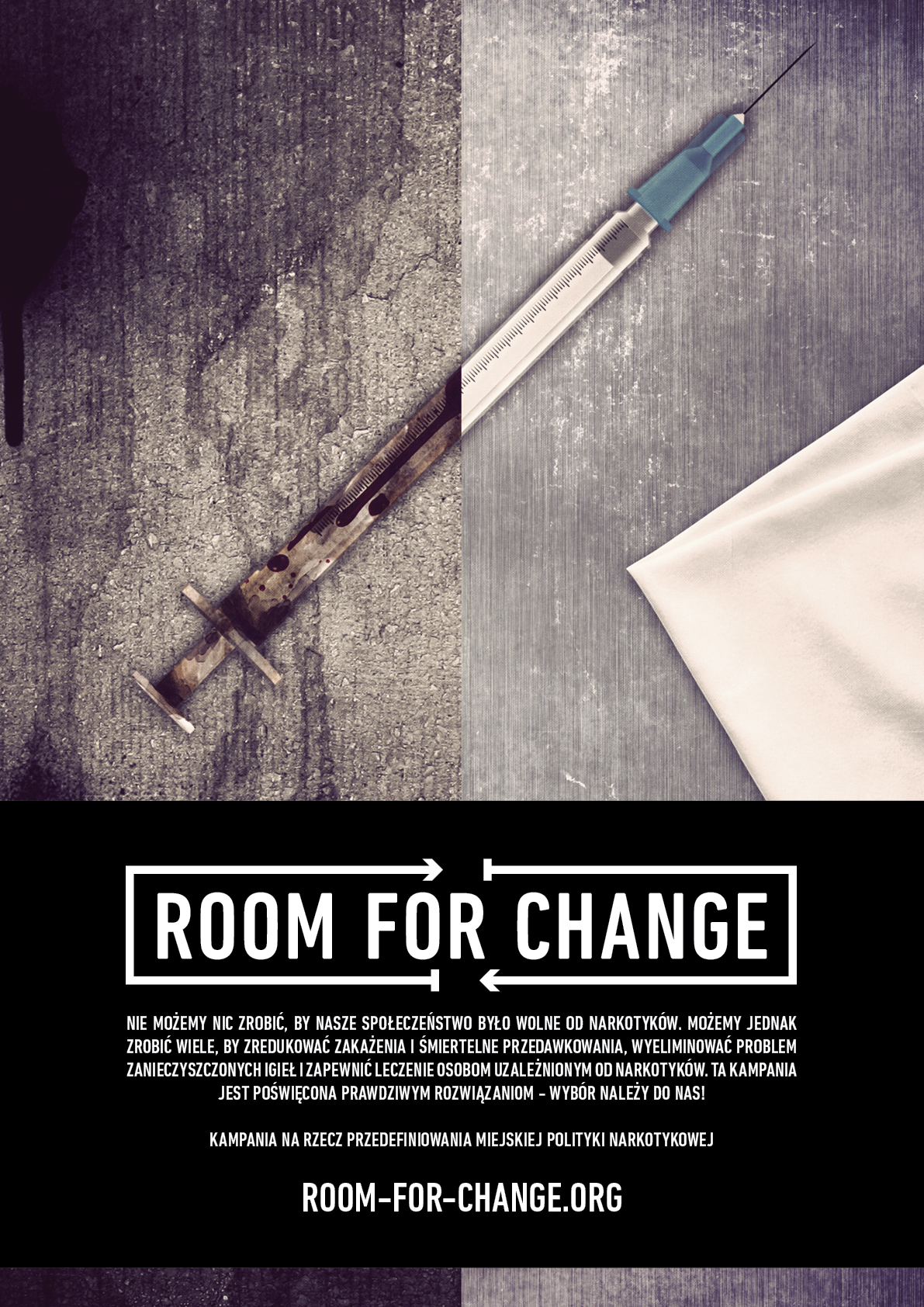On 26th of June 2015, as many as 150 cities all over the world joined the “Support, Don’t Punish” campaign, to mark Global Action Day. For eight cities in Europe, it was also the opening day of the “Room for Change” campaign, advocating for safe injection rooms for people who inject drugs. In this context, the situation of the Warsaw Harm Reduction Foundation is especially alarming.
The Harm Reduction Foundation was founded four years ago, by Magdalena Bartnik, a Polish activist. The Foundation team has been working in the field for over ten years. The organisation, the largest service provider in Poland, runs a drop-in point for people who inject drugs, as well as the biggest needle and syringe exchange program in Warsaw, serving around 600 clients per year. Black clouds appeared above the Foundation few months ago, when it turned out that after three years, the contract for their premises might not be extended. This was as a result of conflicts with the local community, with complaints made to the housing authority, as well as the negative attitude of local government.
Declarations and reality
The official position of the state, and of the Polish National Bureau for Drug Prevention (an agency of the Ministry of Health) in particular, is to support and scale-up harm reduction programs. Coverage of opioid substitution treatment and needle exchange programs is, however, ridiculously low, and the quotas set in successive national drug strategies are never met. Public expenditure on law enforcement action against people who use drugs significantly exceeds the combined amounts spent on prevention, therapy, and harm reduction. Harm reduction services are able to reach just 5-10% of the people who need them – partly as a result of political opposition, but also because of the negative attitude of some of Poland’s biggest ‘drug-free’ organisations. The community of therapists and doctors – especially psychiatrists – also has a negative view of opioid substitution treatment and needle exchange. In the largely conservative and Catholic society that is Poland, such activities are seen as morally unjustified – as, “helping those filthy junkies sustain their bad habit” – practically a crime.
Systematic extermination
 Drug policy responses in Poland are focused on law enforcement and drug-free therapy. This creates a stalemate situation, where it is almost impossible to even begin a discussion about different approaches. Within the framework of the Polish system, there is no place for people who use drugs: they simply don’t have a right to be part of society. There is no drug use, there is just drug abstinence. Opioid substitution programs, as a rule, have a high entry threshold, with strict controls, and rules tying people to the program. Sadly, instances of abuse of power are also not unusual. Many of the needle exchange programs which are officially listed as operating, are in fact closed.
Drug policy responses in Poland are focused on law enforcement and drug-free therapy. This creates a stalemate situation, where it is almost impossible to even begin a discussion about different approaches. Within the framework of the Polish system, there is no place for people who use drugs: they simply don’t have a right to be part of society. There is no drug use, there is just drug abstinence. Opioid substitution programs, as a rule, have a high entry threshold, with strict controls, and rules tying people to the program. Sadly, instances of abuse of power are also not unusual. Many of the needle exchange programs which are officially listed as operating, are in fact closed.
According to official data from a couple of years ago, all the country’s needle exchange programs (three drop-in centres and four programs operating next to addiction treatment centres) reached a total of 2000 clients. At the same time, estimates suggest that there are 15-19 thousand problematic opioid users (people injecting stimulants or new psychoactive substances are not included in those numbers). This shows how the country is, or rather is not, concerned about the problem. Homeless shelters do not, in general, accept people using drugs. In the whole country, there are 45 beds dedicated for active drug-users (including three beds in Warsaw). No help exists for finding accommodation or work, and there is nothing to help reintegrate drug-users into society. Organisations providing needle exchange services are struggling to survive, in the face of extremely low levels of funding. Beyond this, such agencies often also have to waste their time fighting with the police and trying to protect their clients. This results in a situation where they are simply unable to provide proper social work for their clients. They can do very little to help, beyond just providing sterile paraphernalia and a place to spend a few hours of the day. Recent events, however, suggest that they will soon not even be able to provide that.
Unequal fight
When I interviewed the Harm Reduction Foundation in March, the threat of the local authority not extending the contract for their property was already looming. What has been happening during the last weeks, however, is like a grim joke. First, during the negotiations with the local authority, the Foundation’s manager was told, “Well, of course we’re not going to extend the contract. You should think yourselves lucky you were even allowed to stay here this long, undertaking THIS kind of activity”. The Foundation therefore started looking for another place among the city’s properties. It should be mentioned that the organisation isn’t even seeking the preferential rental to which NGOs are entitled. It is willing to pay the market rate. Some suitable units did exist – large enough, at a distance from residential buildings, in a reasonable location. So, what was the problem? One of them mysteriously disappeared from the authority’s website, as soon as the Foundation expressed a willingness to rent it. During a phone call, a clerk claimed that no such property had ever been available for rent. A second property was announced to have been rented out a few weeks earlier. It is still empty. Negotiations regarding a third site were at an advanced stage. The organisation started to raise funds for the renovation. There was a meeting with district officials, as well as people supporting the Foundation. Suddenly, out of the blue, a council expert showed up with documents claiming that the building was about to be demolished.
The National Bureau for Drug Prevention is too weak – their intervention wouldn’t change anything. Everything is in the hands of local government, so the only person who could apply some pressure is the president of Warsaw herself. The problem is, she just doesn’t care. After all – who would bother with such a trivial issue, right?
In Hungary, people who have an interest in drug policy, but are not actually directly involved, often ask me, “What is the difference between the situation in Poland and in Hungary – it’s probably much worse here, isn’t it?”. Well, to be honest, I can see just one difference: In Hungary, the government approach is consistent – saying they’re against harm reduction, and doing everything possible to destroy it. In Poland, by way of contrast, we see an incredible level of hypocrisy: The declarations are noble, but reality is far, far different from the fine words.
Iga Jeziorska




